This article was produced in partnership with Capital & Main, which was a member of ProPublica’s Local Reporting Network in 2022-23. Sign up for Dispatches to get stories like this one as soon as they are published.
In the midst of an ongoing housing emergency, the city of Los Angeles has struggled to keep rent-controlled housing, which includes some of the city’s most affordable dwelling units, from turning into short-term rentals. Even though a 2018 law prohibits such conversions, enforcement has been lax.
“Except in a handful of cases, we’re not actually doing that enforcement work in a meaningful way,” said Los Angeles City Councilmember Nithya Raman, who chairs the council’s Housing and Homelessness Committee and is working on recommendations to tighten enforcement.
For locals who want to keep their neighborhoods residential or visitors who want to avoid inadvertently booking a unit that skirts local law, navigating the Wild West that is LA’s vacation-rental market can be a challenge. This story covers some signs to watch out for and offers a quick two-step guide you can use to make sure your potential home share — or your neighbor’s — isn’t an illegally converted rent-controlled apartment.
Legally, LA hosts can offer only their own “primary residences” for short stays, and only if those dwellings are not covered by the city’s rent-control law. (Some 660,000 housing units in LA are rent controlled, meaning annual rent increases are capped — usually at about 4% for existing tenants.)
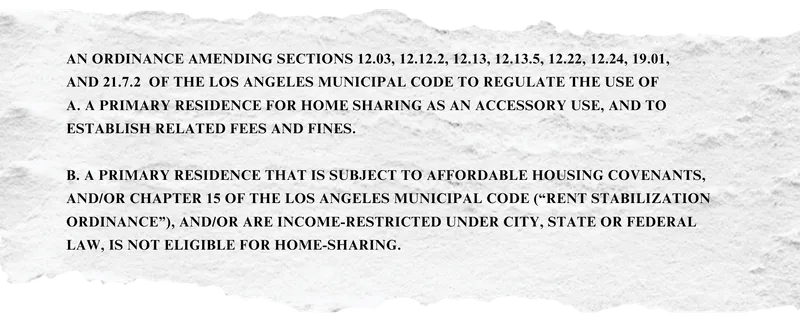
Hiding in Plain Sight
In July, a Capital & Main and ProPublica investigation found that at least 63 rent-controlled buildings that were advertised on booking sites last spring were in apparent violation of the city’s Home-Sharing Ordinance.
The listings hide in plain sight on vacation platforms like Booking.com and Hotels.com, making it hard to distinguish legitimate rentals from those that operate illegally.
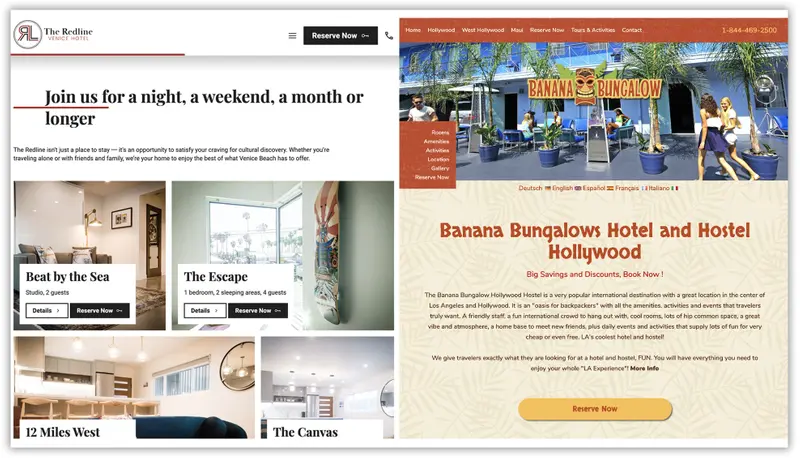
The news organizations found at least 15 rent-controlled buildings — including Banana Bungalow and Redline Venice — that used outdoor signs or online ads to brand themselves as hotels or hostels. According to city law, their rent-controlled status would make them ineligible for use as vacation rentals.
The owners of the 34-unit Banana Bungalow and the four-room Redline Venice didn’t return phone calls. Mark Wurm, the owner of the Venice Beach Hostel, said, “They have it wrong,” referring to the city’s classification of his building as rent controlled. Wurm said the building had long been used as a hotel.
Traditional home shares that don’t purport to be hotels, like those listed on Airbnb or other vacation platforms, also sometimes skirt the law.
One Renter’s Eye-Opening Experience
In May, Rhys Atkinson-Whipps, an Australian transplant, told Capital & Main that he entered LA’s short-term rental market when his apartment underwent major repairs. He said he booked several rentals for weeklong or shorter stays because he expected the repairs to be completed sooner than they were. Atkinson-Whipps, who works at a Hollywood shelter for homeless youth, said he found that the home shares he booked were not always what they seemed.
One listing promised an apartment in Hollywood. But after booking it, Atkinson-Whipps said, he learned it was in Koreatown — miles from where the listing said it was. He thought the bait and switch was sketchy. “You book one place and you turn up somewhere else,” Atkinson-Whipps said. “It’s like you have no power at all.” The listing has since been taken down, he said.
Sometimes listings display more desirable neighborhoods than their actual locations, with the correct details revealed only after booking. In other cases, properties are listed in neighboring cities to evade LA’s home-sharing rules, according to a report by Better Neighbors LA, a nonprofit watchdog group that monitors short-term rentals.
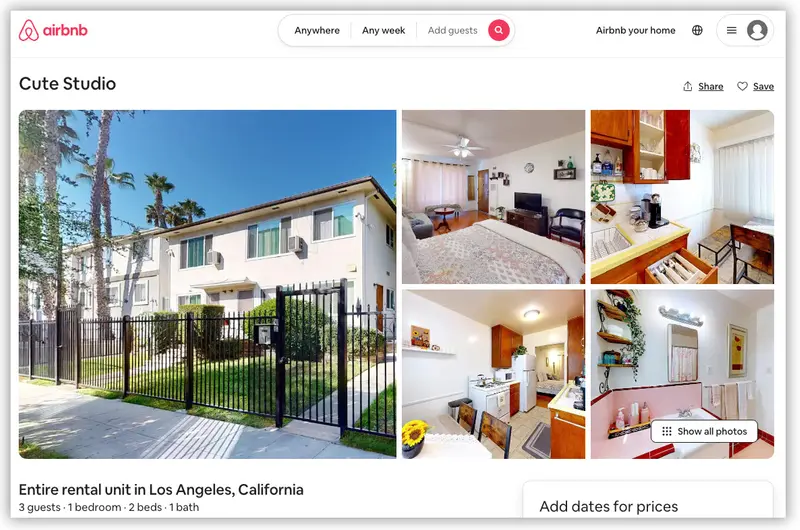
Atkinson-Whipps said he also rented a Hollywood apartment that Airbnb listed as a “cute studio.” It turned out to be part of a 14-unit building listed in the Housing Department’s database as rent controlled, which would make it off-limits for short-term rentals.
The owner of the building, which is on Harold Way in Hollywood, is listed as DND ES Properties. A man who identified himself as Edward Dratver, a manager of the company, denied that any of its units are listed on Airbnb. “No,” he said. “Something’s wrong. Some mistake,” Dratver said before quickly ending the call.
However, the apartment was advertised on the site in August despite Airbnb’s 2019 agreement with the city that it would remove illegal listings.
The number of Airbnb listings that aren’t registered with the city for home sharing is on the rise, up from 277 in August 2023 to more than 900 currently, according to Better Neighbors LA. The group cited its analysis of data from Inside Airbnb, a research and advocacy organization that is critical of Airbnb. A planning department report to the City Council noted that as of February, 58% of all the short-term rental listings in the city didn’t comply with city law. These buildings have typically received warning letters from the city planning department.
Airbnb declined to provide a response for this story.
Some Listings Include Fake Credentials
Hotels.com and Booking.com also feature a number of rent-controlled properties that appear to be ineligible for home sharing. But Capital & Main found that Booking.com — the third-largest vacation rental platform in the city — includes listings that say the properties are legally registered with the city for home sharing when they’re not.
Several Booking.com listings include nonexistent, expired or completely fabricated home-sharing registration numbers. Others include a “fine print” section in which hosts wrongly claim that a home-sharing registration isn’t required for their properties.
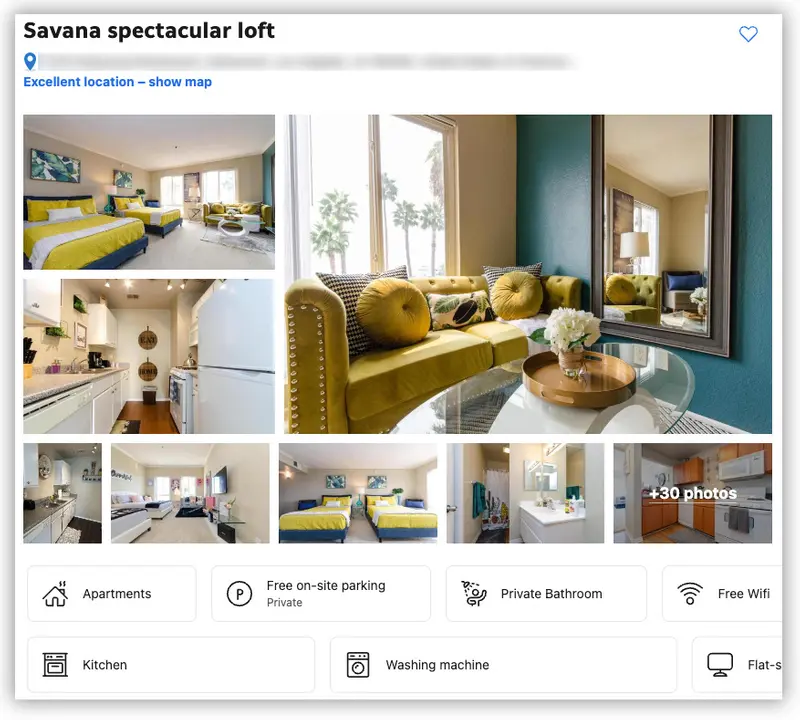
A unit advertised on Booking.com as the “Savana Spectacular Loft” — an apartment in a rent-controlled building — appeared to have city permission to operate because the listing included three home-sharing registration numbers. But none of the registration numbers exist, according to the LA planning department’s home-sharing lookup tool. In fact, listing multiple registration numbers is likely an indication that something is amiss, because the city issues only one home-sharing registration per property owner.
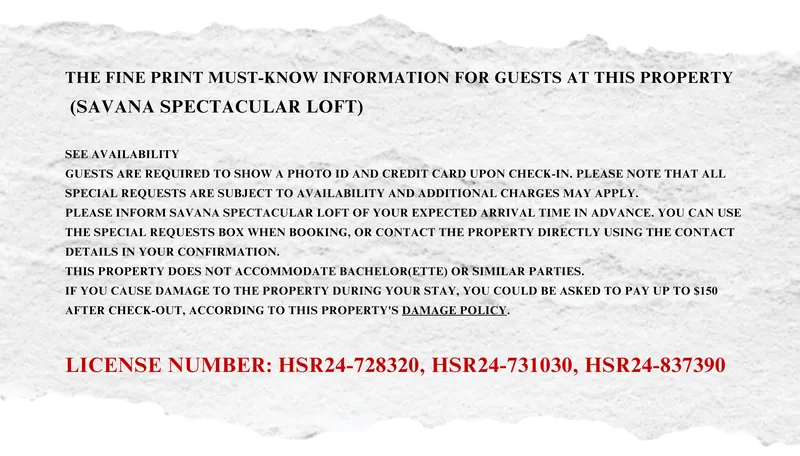
At Realty Center Management Inc., which manages the building, a representative said the company would not comment.
Booking.com did not respond to an email requesting comment on the registration numbers and the company’s procedures for determining if listings comply with local law. Media representatives at Hotels.com also didn’t respond to emails inquiring about listings of rent-controlled properties.
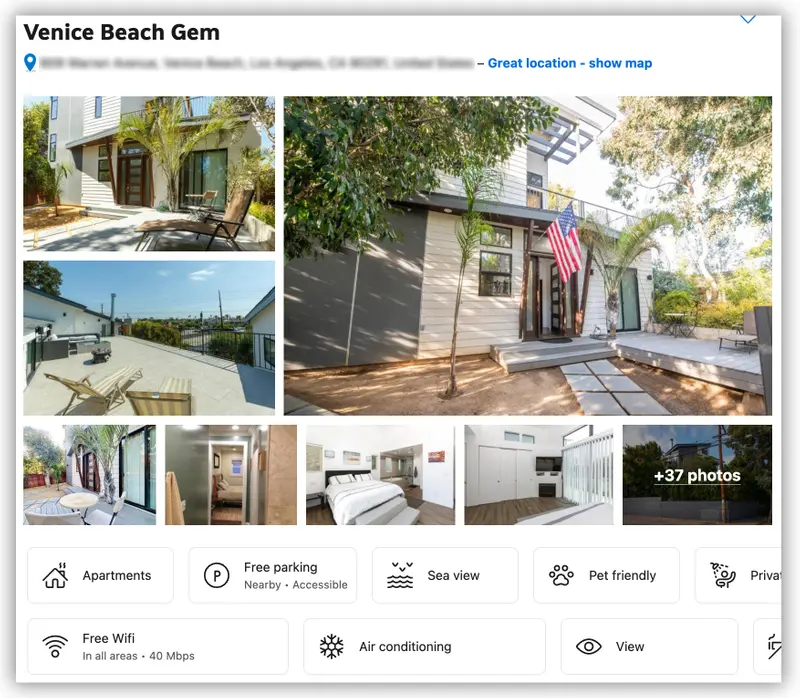
A mile from the beach, the Booking.com listing for a “Venice Beach Gem” features mountain and ocean views and a tennis court.
The ad displays a Los Angeles home-sharing registration number, but it contains too many digits and lacks the required letters found in city-issued registrations. The units for rent on the site are located in a rent-controlled apartment building, according to the Housing Department’s database, and cannot legally be registered for home sharing.
The city fined the Venice Beach units’ owner twice in 2021 for advertising short-term rentals without an official registration. The fines haven’t been paid, according to the city attorney’s website of administrative citations. Still, the units were listed on Booking.com last month.
The property owner didn’t return Capital & Main’s calls.
In some cases, renters, not building owners, have been accused of listing illegal short-term rentals. LA City Attorney Hydee Feldstein Soto recently sued several people she says earned more than $4 million by leasing apartments for the sole purpose of offering unregistered short-term rentals, some of them in rent-controlled buildings. The defendants have denied the allegations in court filings.
Under the home-sharing law, booking platforms can be fined $1,000 per day for accepting bookings for properties that don’t have official registrations.
In 2022, the city settled a lawsuit against Vrbo for $150,000, accusing it of processing thousands of illegal bookings. The company agreed to remove illegal listings from the platform. A spokesperson for Vrbo’s owner, Expedia, said the company is working “to help drive a high rate of compliance with local laws.”
The City Council’s Housing and Homelessness Committee is expected to consider recommendations for improving home-sharing enforcement in September.
Meanwhile, for vacationers and locals who want to check the legality of a short-term rental, Capital & Main and ProPublica prepared a two-step guide to researching potential listings before you book:
Haru Coryne contributed reporting.


















